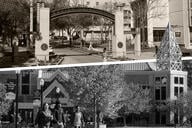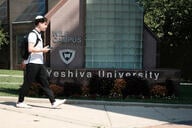You have /5 articles left.
Sign up for a free account or log in.
It’s never good when the president-bishop relationship plays out in the press.
This is the case with the four Roman Catholic colleges in the Diocese of Scranton. Bishop Joseph F. Martino has twice in recent months issued public calls asking colleges to document their practices with regard to Catholic moral teachings -- with the latest exchanges coming this week.
First, after clashing with Misericordia University over a February speaking appearance by Keith Boykin, an advocate for gay marriage, Bishop Martino asked Misericordia to specify how it teaches Catholic moral positions on sexuality -- and to “speak precisely, naming courses, content and even catalog numbers.” Misericordia asked for a private discussion with the bishop, who in turn announced that he would not meet with Misericordia officials until they publicly released the information he sought.
Just this week, Bishop Martino likewise deemed "insufficient" the response of four Catholic colleges to another sex-related inquiry, this one into contraceptives. The presidents of King’s College, Misericordia, Marywood University and the University of Scranton said in a joint three-paragraph letter Monday that they do not provide condoms or oral contraceptives on campus. But in a written statement released by the diocese Wednesday, the bishop and auxiliary bishop pressed for proof, seeking documentation.
The inquiry into contraceptives was originally spurred by a student newspaper article at Saint Joseph's University, in Philadelphia, about an "effort to find the middle ground between Church doctrine and student healthcare." Saint Joseph's is located outside the Diocese of Scranton. But the bishop subsequently looked closer to home. He cited as reasons for concern a Wilkes-Barre Times Leader article suggesting that pamphlets about birth control are available in the King's Student Center, and also the inclusion of contraceptives/condoms on a Marywood packing list for international students (right between "tampons, pads" and "contact lens supplies" -- condoms were deleted from the online list Wednesday).
"We believe (these examples) justify the urgency of our request for documentation," the bishop and auxiliary bishop wrote.
The colleges are now in lock-down mode, offering no further public comment.
This is, in short, a case where the ideal bishop-president relationship broke down. Ex Corde Ecclesiae, the influential 1990 Vatican document on the relationship between Catholic universities and the church, defines the bishop's responsibilities this way: "Bishops have a particular responsibility to promote Catholic Universities, and especially to promote and assist in the preservation and strengthening of their Catholic identity, including the protection of their Catholic identity in relation to civil authorities. This will be achieved more effectively if close personal and pastoral relationships exist between University and Church authorities, characterized by mutual trust, close and consistent cooperation and continuing dialogue."
"This is where a good percentage, actually I would say a very high percentage, of observers of the situation in Scranton would say the matter has fallen apart. The bishop's style is not one that one would characterize by mutual trust, close and consistent cooperation and continuing dialogue," said Richard A. Yanikoski, president of the Association of Catholic Colleges and Universities.
"Rather than having a primarily pastoral model characterized by mutual trust, as Ex Corde said, he comes across as being more imperious, sort of high-handed in his relationships, which does not generally lend itself to productive, long-term progress.
"And that's not a comment on whether or not it's appropriate for him to be concerned about issues. It's just a question about how one goes about expressing that concern," Yanikoski said.
"Just as there is a spectrum of college presidents, from those who are rather authoritative to those who are rather collaborative, you have bishops across the spectrum, as well."
Several Catholic college leaders interviewed about the bishop-president relationship stressed the need for regular communication. "I think it was because we established relationships that we were able to work well together," said Sister Carol Jean Vale, president of Chestnut Hill College, in Pennsylvania. "That was the key -- that, over a period of time, we came to know each other better. And in coming to know each other, it built a trust and a confidence that enabled genuine dialogue to take place, and again, if there were sensitive issues, we did feel free to discuss them in an atmosphere that is respectful and safe.
"In my experience, the interactions have been very positive because of the relationships that have been established between presidents and the bishops. Do they break down in instances? Yes, they do. Is there misunderstanding between college presidents and bishops? Yes, there is. I would have to say that I have been most fortunate not to have that happen," she said.
"The pressure comes if in fact you're doing some things that push the envelope," said James T. Barry, president of Mount Marty College, in South Dakota. Commencement, he added, is a common pressure point. (Just ask the University of Notre Dame, which has come under heavy criticism from some Catholics for its pro-choice commencement speaker, President Obama, who will receive an honorary degree.)
"But by and large, it's not benign neglect, but cohabitation," Barry said. "Again, by personality of the bishop or personality of the president you either enjoy a close relationship or perhaps a more distant relationship. But you have to keep, it's absolutely essential, that you keep the lines of communication open.
"Bishops don't like surprises and neither do college presidents," Barry said.
"There are natural tensions that are not unhealthy between the academy and its church. Because in part the purpose of education is to push the envelope" -- and make Catholic teachings relevant to students' lives, said Donna M. Carroll, president of Dominican University, in Illinois.
"It's fraught with conflict, it's messy at times, and it's painful when that plays out in the news because the Catholic identity of institutions is so much richer and so much more varied. It's much more than tension between a bishop and a cardinal about a speaker," Carroll said.
Speaking of the Scranton inquiries on sexuality, Donna Freitas, a visiting assistant professor of religion at Boston University, echoed a similar point. Freitas is author of Sex and the Soul (2008, Oxford University Press), which described students' attitudes and experiences with dating and sex at Catholic, evangelical and secular colleges.
"I would ask them, 'When you were growing up, what did your [faith] tradition teach you about sex and also about dating?' From the kids who grew up Catholic, I got very specific answers that often came with a lot of sarcasm: 'Don't be gay, don't have sex, don't use birth control.'
"It's really unfortunate when, for example, a Catholic college's identity becomes wrapped up in whether or not birth control is offered on campus or is available on campus, because that really reinforces to students that there are these very specific particularities that define a Catholic campus. Whereas, for example, students love discussions of discernment and Catholic social justice teaching and what we often don't do is raise questions about sexuality in the context of Catholic social justice teachings, about human dignity, that kind of thing."




